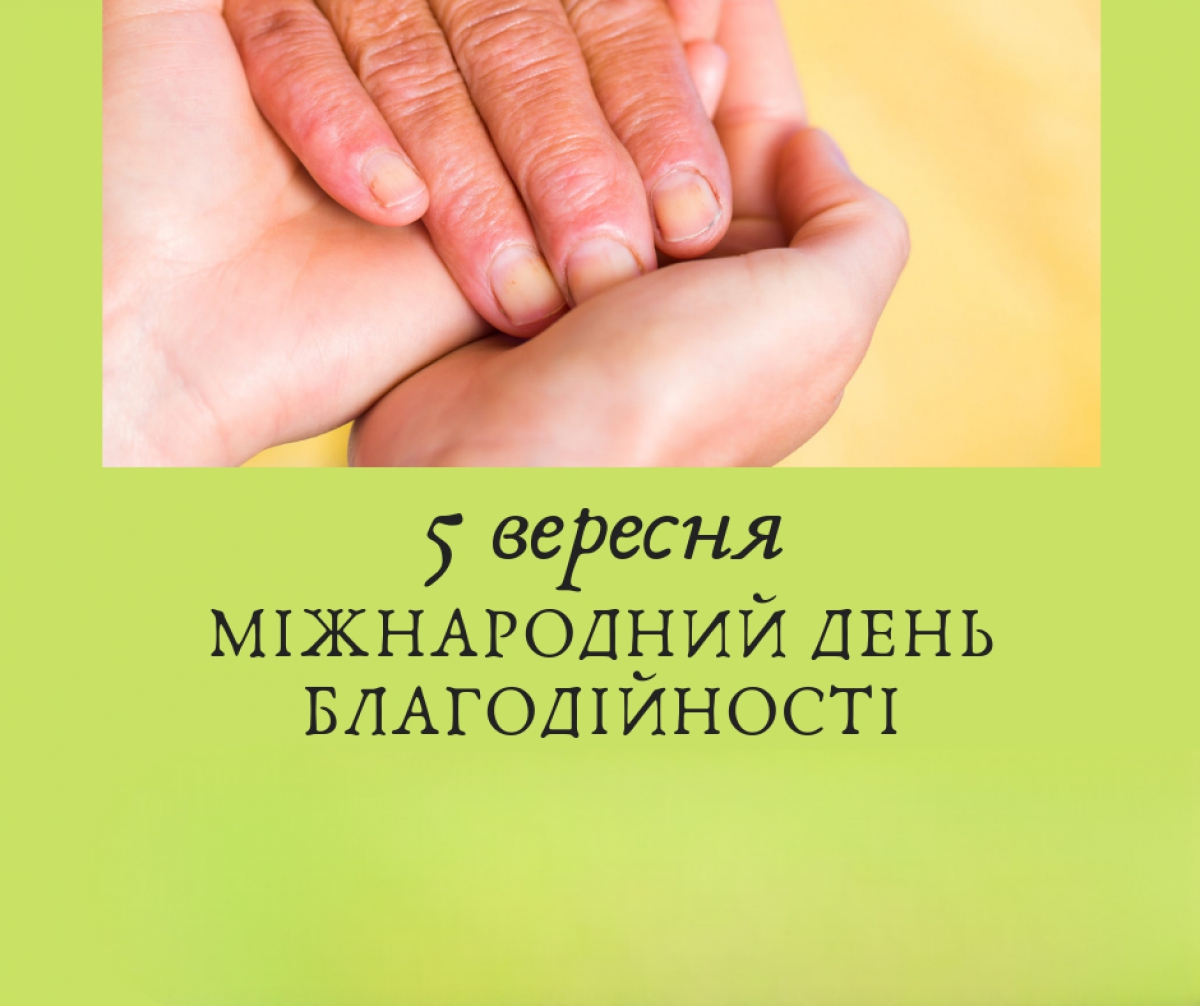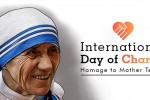Eduard Abashia, a lecturer at the Department of Psychology at the Dnipro Institute of PJSC "IAPM", a lawyer, psychologist at the Amur-Nizhnodniprovskyi district department of the State Institution "Probation Center" branch in Dnipropetrovsk region, and a member of the International Association of Psychologists and Consultants on Sexual Education, provides the following information. Charity, like volunteering and philanthropy, ensures real social connection and contributes to creating inclusive and more resilient societies. Charity can alleviate the worst consequences of humanitarian crises, complement public services in healthcare, education, housing, and child protection. It promotes the development of culture, science, sports, and the protection of cultural and natural heritage. It also advocates for the rights of marginalized and vulnerable populations and spreads ideas of humanity in conflict situations.
In the 2030 Agenda for Sustainable Development, adopted in September 2015, the United Nations recognizes that eradicating poverty in all its forms and dimensions, including extreme poverty, is the greatest global challenge and an indispensable requirement for sustainable development. The Agenda also calls for strengthening the spirit of global solidarity, focused particularly on the needs of the poorest and most vulnerable. It also acknowledges the role of the diverse private sector - from micro-enterprises and cooperatives to multinational corporations, as well as the role of civil society organizations and charitable organizations in implementing the new Agenda.
The 17 Sustainable Development Goals (SDGs) outlined in the Agenda can be grouped into six critical areas: people, planet, prosperity, peace, and partnership. They have the potential to transform our lives and our planet, providing the foundation necessary for charitable institutions to enable all people to contribute to improving our world.
The International Day of Charity was established to raise awareness and mobilize people, non-governmental organizations, and stakeholders worldwide to help others through volunteer and philanthropic activities. The date of September 5th was chosen to commemorate the anniversary of Mother Teresa of Calcutta's death, who received the Nobel Peace Prize in 1979 "for work undertaken in the struggle to overcome poverty and distress, which also constitutes a threat to peace."
Mother Teresa, a renowned Catholic nun and missionary, was born on August 26, 1910, under the name Agnes Gonxha Bojaxhiu. She was born in Skopje (now the capital of the Republic of North Macedonia, at that time - the Vilayet of Kosovo, a province of the Ottoman Empire) to an Albanian mother and a Vlach father. From childhood, she dreamed of monastic service and in 1928 went to Ireland, where she joined the religious order "Irish Sisters of Loreto" at the Institute of the Blessed Virgin Mary, and only six weeks later sailed to India as a teacher. She taught for 17 years at the order's school in Calcutta.
In 1931, she took her vows and adopted the name Teresa in honor of the Carmelite nun Thérèse of Lisieux, who was canonized in 1927. In 1946, Sister Teresa felt a "call within the call," which she considered divine inspiration to dedicate herself to caring for the sick and poor. She then moved to the slums she had observed while teaching. At her request, the municipal authorities provided her with a pilgrim dormitory near the sacred temple of Kali, where she founded her order in 1948. Soon, sympathetic companions came to help her. Dispensaries and open-air schools were organized. Mother Teresa adopted Indian citizenship, and all her Indian nuns began wearing saris.
In 1950, her order received canonical sanction from Pope Pius XII, and in 1965 it became a papal congregation (subject only to the Pope).
In 1952, she founded Nirmal Hriday ("Place for the Pure of Heart"), a hospice where the terminally ill could live and die with dignity. Her order also opened numerous centers for the blind, elderly, and disabled.
Under Mother Teresa's leadership, the Missionaries of Charity built a leper colony called Shanti Nagar ("City of Peace") near the Indian city of Asansol. In 1962, the Indian government awarded Mother Teresa the Padma Shri, one of the highest civilian honors, for her service to the people of India. During his visit to India in 1964, Pope Paul VI gave her his ceremonial limousine, which she immediately raffled off to help fund her leper colony. In 1968, she was called to Rome to establish a house there, staffed mainly by Indian nuns.
In recognition of her apostolate, Pope Paul honored her on January 6, 1971, by presenting her with the first Pope John XXIII Peace Prize. In 1979, she received the Nobel Peace Prize for her humanitarian work, and the following year, the Indian government awarded her the Bharat Ratna (Hindi भारत रत्न), the highest civilian honor of the Republic of India. The name translates as "Jewel of India".
In her later years, Mother Teresa spoke out against divorce, contraception, and abortion. She also had poor health and suffered a heart attack in 1989. In 1990, she resigned as head of the order but was returned to the position by an almost unanimous vote - the only dissenting vote was her own. Deteriorating heart condition forced her to retire, and in 1997 the order elected Sister Nirmala, who was born in India, as her successor. At the time of Mother Teresa's death, her order had hundreds of centers in more than 90 countries worldwide, with about 4,000 nuns and hundreds of thousands of lay people working. Two years after her death, the process of declaring her a saint began, and Pope John Paul II issued a special decree to speed up the canonization process. She was beatified on October 19, 2003, reaching the rank of Blessed in the shortest time in Church history. She was canonized by Pope Francis I on September 4, 2016.
Although Mother Teresa demonstrated cheerfulness and deep devotion to God in her daily work, her letters (which were collected and published in 2007) indicate that she did not feel God's presence in her soul for the last 50 years of her life. The letters reveal the suffering she experienced and her feeling that Jesus had abandoned her at the beginning of her mission. Continuing to experience spiritual darkness, she came to believe that she was participating in Christ's Passion, especially at the moment when the crucified Christ says: "My God, my God, why have you forsaken me?" (Gospel of Matthew 27:46). These words express the sadness of a person who feels abandoned by God.
Despite these difficulties, Mother Teresa remained devoted to her faith and work for Christ. For over 45 years, she served the poor, sick, orphaned, and dying, while simultaneously managing the expansion of the Missionaries of Charity's activities, first in India and then in other countries worldwide, including hospices and homes for the poorest and homeless. Mother Teresa's work was recognized and praised worldwide, and she received numerous awards and honors, including the Nobel Peace Prize. Mother Teresa died on September 5, 1997, at the age of 87.
In recognition of the role of charity in alleviating humanitarian crises and human suffering both within and between countries, as well as the efforts of charitable organizations and individuals, including Mother Teresa's work, at its 58th plenary meeting in 2012, the United Nations General Assembly in its resolution A/RES/67/105 proclaimed September 5, the anniversary of Mother Teresa's death, as the International Day of Charity, noted the psychologist.
 Eng
Eng  Укр
Укр 



